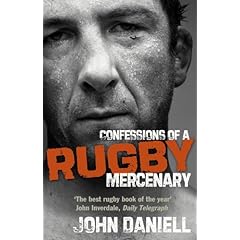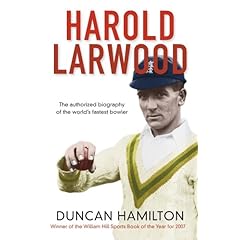ANTON RIPPON reviews the runners and riders on the shortlist for the 21st Sports Book of the Year Award
John Daniell and Harold Larwood were the most disparate of sporting figures. New Zealander Daniell, three times an Oxford Blue and a graduate in English literature, was a rugby mercenary. Larwood, who had once laboured down a Nottinghamshire pit, became inextricably bound to one of the most infamous episodes in cricket history.
Their respective careers were 60 years apart, but now their stories are linked as two of the six books to be shortlisted for the 2009 William Hill Sports Book of the Year.
In 1989, the Hill award got off to a flying start when Dan Topolski and Patrick Robinson lifted the inaugural title with True Blue, a book that told the story of the “Oxford Boat Race Mutinyâ€. There were heroes and villains aplenty between those pages.
The following year, Irish journalist Paul Kimmage scooped the award with Rough Ride, an autobiographical account of a Dublin upbringing and an obsession with cycling that eventually saw him compete in three Tours de France. Kimmage’s stories of the widespread use of performance-enhancing drugs led to him being ostracised by his peers and, as recently as last February, to a spectacular public confrontation with Lance Armstrong, himself a Hill winner (in 2000, with Sally Jenkins, for It’s Not About The Bike: My Journey  Back To Life).
Back To Life).
This year, however, it is hard to see shortlisted authors, from a record 152 entries, falling out either publicly or privately, even though freelance journalist Daniell’s Confessions Of A Rugby Mercenary (Ebury), according to the publisher’s blurb, “lifts the lid off the dark side of the journeyman player†and promises “compelling confessions†of a “shocking†nature.
When rugby union turned professional in 1996, Daniell was one of the first players to move from Britain to the European mainland, where he spent a decade playing for Montpellier. Daniell’s Confessions Of A Rugby Mercenary is about those years, when he and his colleagues battled to save their club from relegation and their own careers from the scrapheap. Ruthless club owners, coaches and agents abound.
In 2007, Daniell saw published what John Inverdale in the Daily Telegraph then described as “the best rugby book of the yearâ€. Alas, Daniell’s Inside French Rugby didn’t do enough to impress the William Hill judges. That year it was  Duncan Hamilton’s memoir of Brian Clough, Provided You Don’t Kiss Me, which took the prize.
Duncan Hamilton’s memoir of Brian Clough, Provided You Don’t Kiss Me, which took the prize.
Hamilton is back this year with Harold Larwood: The World’s Fastest Bowler (Quercus). If he wins, he will be the first author since Donald McRae (Dark Trade: Lost in Boxing, 1996, and In Black and White: The Untold Story of Joe Louis and Jesse Owens, 2002) to win claim two Hill titles.
Larwood, of course, was England’s chief weapon during the 1932-33 “Bodyline†Ashes series in Australia. But after being used, and abused, by upper-crust captain Douglas Jardine, the former Notts miner refused to be made a scapegoat, wouldn’t apologise and never played for England again. That he later emigrated to Australia and lived happily there for the rest of his life only adds to a story told by Hamilton that is as much about issues of class and social standing in early 20th-century Britain as it is about cricket.
 Former Bookseller editor Nicholas Clee is nominated for Eclipse: The Story of the Rogue, the Madam and the Horse That Changed Racing (Bantam). Horse racing last won with Seabiscuit by Laura Hillenbrand in 2001 and with this book, Clee must stand a good chance of another equine triumph.
Former Bookseller editor Nicholas Clee is nominated for Eclipse: The Story of the Rogue, the Madam and the Horse That Changed Racing (Bantam). Horse racing last won with Seabiscuit by Laura Hillenbrand in 2001 and with this book, Clee must stand a good chance of another equine triumph.
Eclipse, a chestnut with a white blaze, was the horse from which 95 per cent of all thoroughbreds racing today are descended. But Clee’s book is also about two wonderful characters: William Wildman, a meat salesman and the horse’s owner; and Dennis O’Kelly, an adventurer, gambler and thorough rogue whose mistress was one of the leading brothel keepers in rollicking Georgian London.
No book about motor sport has ever won the Hill award, but The Times‘s Rick Broadbent, one of the longest serving members of the pack of journalists who cover MotoGP, must stand a good chance with Ring Of Fire: The Inside Story Of Valentino Rossi and MotoGP (Bantam).
Broadbent’s inside knowledge takes the reader far beyond the PR machine and alternates between anecdotes and tales from the last 10 years of top-class motorcyle racing, and stories from the era when Mike Hailwood made a triumphant return to the TT in 1978. The inference drawn is that 30 years ago, top riders had just as much fun, but that death and serious injury were much more common.
 Football books have produced five Hill winners and two on that sport complete this year’s shortlist.
Football books have produced five Hill winners and two on that sport complete this year’s shortlist.
Ian Hawkey has been an international football correspondent for the Sunday Times since 2001. He has lived in four African countries (Nigeria, Egypt, Zimbabwe and South Africa) and visited a further 24 African nations in the course of researching Feet of the Chameleon: The Story of African Football (Portico).
As you would expect from a continent whose history is a tangled web of social and political upheaval, the story of football here follows a similar path. African football has had to overcome racism, corruption and political interference, but it has produced some of the world’s best players, many of whom have graced European leagues.
Hawkey has looked at the emergence of stars like Michael Essien and Samuel Eto’o and also analysed the unique qualities that produced performances like Cameroon’s World Cup campaigns and Nigeria’s Olympic gold medal in 1996.
Award-winning novelist Graham Joyce’s Simple Goalkeeping Made Spectacular: A Riotous Footballing Memoir About the  Loneliest Position on the Field (Mainstream), looks back on a lifetime of standing between the posts (or sometimes coats), from schoolboy football (his primary school won the Coventry and District Shield with scores like 14-0, so Joyce was rarely obliged to touch the ball), pub teams, and, at the age of 52, a call-up to play for an England Writers’ XI in a sort of literary World Cup competition.
Loneliest Position on the Field (Mainstream), looks back on a lifetime of standing between the posts (or sometimes coats), from schoolboy football (his primary school won the Coventry and District Shield with scores like 14-0, so Joyce was rarely obliged to touch the ball), pub teams, and, at the age of 52, a call-up to play for an England Writers’ XI in a sort of literary World Cup competition.
Joyce’s fiction work has been variously catagorised as fantasy, science fiction, horror and mainstream literature, so expect something a little offbeat with Simple Goalkeeping.
This year’s shortlist looks as strong as ever, although I would have liked to see included Blood Over Water, David and James Livingstone’s account of sibling rivalry as members of opposing Boat Race crews.
Now in its 21st year, this is the world’s richest sports book award, with the winner receiving £21,000 plus a £2,000 William Hill bet, a hand-bound copy of the book, and a day at races. The runners-up receive £3,000, plus a £1,000 William Hill bet, and a leather-bound copy of their book. The long-listed authors who missed out on the shortlist won a £250 free bet.
The winner will be announced at Waterstone’s, Piccadilly, from 1.30pm on Thursday, November 26.
Click here for more recent articles on journalism, sport and sports journalism